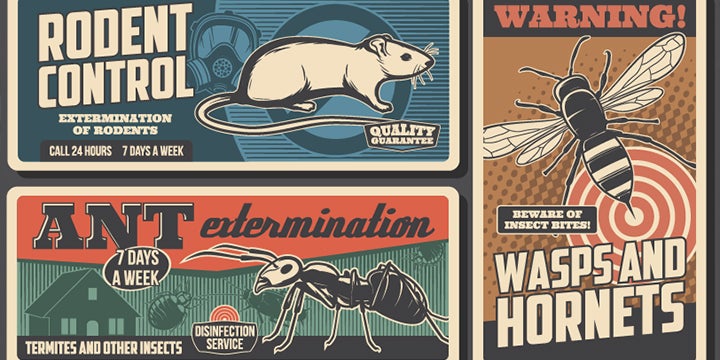The History of Pest Control

Saturday, June 6th, is World Pest Day.
This multinational event was created to raise awareness with the public of the pest management industry and how they protect our health and safety daily.
Pest control has a long and storied history. Since the beginning of time, pests have been a nuisance to mankind. Not only do they carry and spread disease, but they can destroy our food sources, such as crops. From cavemen swatting at annoying flies and mosquitoes, to the Egyptians using cats to control rodents around their grain stores, the search for the perfect pest control is older than the pyramids. It makes sense to think that pest control is as old as agriculture but, given that agriculture began around 8000 B.C. and the first instance of pest control wasn’t documented until 3000 B.C., that’s not necessarily the case.
The Sumerians, located in Mesopotamia (now southern Iraq), created the foundation for an agricultural society. In 2500 B.C., they introduced the use of chemicals by using sulfur as a way to prevent insects from invading their crops. Fast forward a thousand years to 1500 B.C., and the next recorded event is where we see farmers manipulating planting dates to control pests. In fact, this method is still in use today.
By 1200 B.C., Chinese farmers used botanical insecticides as fungicides to treat seeds. Another genius trick they had was to use predatory ants to protect their citrus orchards. They would tie ropes or bamboo sticks between adjacent branches so the ants could easily move from place to place.
As with most things in the Middle Ages, the advances in pest control suffered a major setback. In an article published in PCT Magazine by Dr. Jerome Goddard, “After the Roman Empire, and during the ensuing Dark Ages, science basically disappeared from Europe, and along with it, much of sanitation and health-related arts. There is some evidence that monks and other church leaders rarely bathed, considered cleanliness as an abhorrence, and were vermin-ridden. Plague, leprosy, smallpox and tuberculosis emerged among the population, decimating Europe from about 800 A.D. to 1400 A.D.” Additionally, with little to no education among the general public, many believed that pests and fleas were a punishment from God.
Luckily, the Renaissance era brought science back to the forefront, and mankind started experimenting with chemicals like nicotine, certain herbs, and arsenic to repel insects. Although progress continued to move forward with the use of various chemicals to ward off pests, there was little in terms of inventions in technology. It wasn’t until the 1700s when Franz Ernst Brückmann, a German physician, designed a mechanical flytrap to capture various insects. He also invented the flea trap, which became popular as fashion accessories since their ornate designs were created from ivory or silver and worn by the European aristocracy.
The first lethal mousetrap was patented by James M. Keep on November 4, 1879. It was named Royal No. 1, and although this was not the first mousetrap on the market, it used a set of spring-loaded, cast-iron jaws that simplified the design to make it easy to manufacture. In the late 1800s, the pest control industry gained momentum with entomologists and chemists working together to create chemical pesticides that we still use today. By the 20th century, pest control is a credible and valued profession.
Today, our reliance on technology and advancements in pest control is as vital as ever. Pest control software and apps have revolutionized the way we run our business by creating efficiencies, automating tasks, and collecting revenue. From hospitals to our homes, to the food industry and beyond, the pest control industry continues to keep us safe and healthy.





